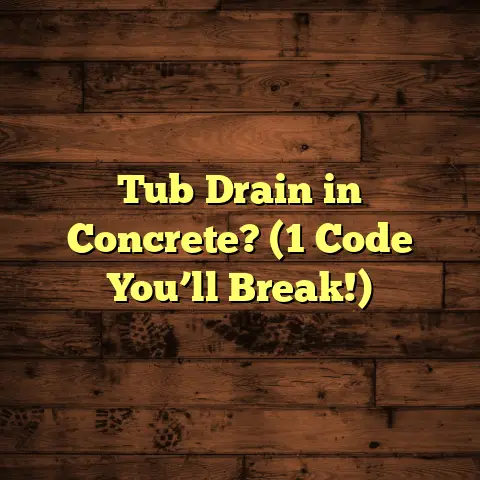Garage Floor Bolts: When Are They Needed? (5 Min Check!)
Ever tripped over something in your garage? Or maybe you’ve struggled to maneuver around that heavy workbench? I get it!
Accessibility in the garage is key to a functional and safe space. We’re talking about more than just parking your car; it’s about having a space where you can easily work on projects, store tools, and move around without breaking an ankle.
A big part of achieving that accessibility? Making sure everything is secure. That’s where garage floor bolts come in.
Think of them as the unsung heroes of garage organization. They’re not glamorous, but they play a vital role in keeping things in place and preventing accidents.
In this article, I’m going to break down when you absolutely need garage floor bolts. We’ll cover the different types, why stability matters, and how to quickly assess your own garage in just five minutes. Let’s dive in!
Section 1: Understanding Garage Floor Bolts
So, what are garage floor bolts? Simply put, they’re fasteners designed to anchor items to your garage floor. They provide a secure connection, preventing movement and ensuring stability.
Think of them as the “root system” for your garage equipment. Without them, things can shift, wobble, or even tip over, creating a safety hazard and a logistical nightmare.
Different Types of Bolts
There are several types of bolts commonly used in garage floors, each with its own strengths and applications. I’ve used all of these at one point or another, and knowing the differences can save you a lot of headaches.
-
Expansion Bolts: These are probably the most
common. They work by expanding within the concrete
as you tighten them, creating a super-strong grip.
I often use these for heavier items like workbenches
or shelving units. -
Concrete Anchors (Sleeve Anchors): Similar to
expansion bolts, but they have a sleeve that expands
along the entire length of the bolt. This provides
even more holding power, especially in older or
weaker concrete. -
Lag Bolts with Shields: These involve drilling a
hole, inserting a metal or plastic shield, and then
screwing in the lag bolt. The shield expands as you
tighten the bolt, providing a secure anchor. I find
these useful for lighter-duty applications. -
Epoxy Anchors: For seriously heavy-duty
applications, you can use epoxy anchors. These
involve injecting epoxy into a drilled hole and then
inserting a threaded rod. The epoxy hardens, creating
an incredibly strong bond. I’ve used these for
securing heavy machinery in commercial garages. -
Wedge Anchors: Wedge anchors are designed for
heavy-duty applications where high pull-out strength
is required. They consist of a steel bolt, a clip,
and an expansion wedge. When the bolt is tightened,
the wedge is drawn into the clip, expanding it
against the walls of the drilled hole, creating a
secure and reliable hold.
Materials Matter
The material of your garage floor bolts is crucial. You want something that’s going to last and resist corrosion, especially if you live in an area with high humidity or harsh winters.
-
Steel: A common and affordable option. Look for
steel bolts with a protective coating, like zinc
plating, to prevent rust. -
Stainless Steel: The gold standard for corrosion
resistance. Stainless steel bolts are more expensive,
but they’ll last a lifetime, even in the harshest
environments. -
Galvanized Steel: Galvanization involves coating
steel with a layer of zinc to protect it from rust.
Galvanized steel bolts offer a good balance of
affordability and corrosion resistance.
A Quick History
Believe it or not, garage flooring has evolved quite a bit over the years. Early garages often had dirt or gravel floors, which were obviously not ideal for stability or cleanliness.
Concrete became the standard, but even then, there wasn’t always a focus on securing items. As garages became more than just parking spaces – evolving into workshops, storage areas, and hobby centers – the need for secure anchoring became apparent.
That’s when garage floor bolts started to become a standard practice in home improvement. They’re a relatively simple solution to a complex problem: keeping your garage safe, organized, and functional.
Section 2: The Importance of Garage Floor Stability
Okay, so we know what garage floor bolts are. But why is stability so important in the first place? It’s about more than just aesthetics; it’s about safety and functionality.
A stable garage floor provides a solid foundation for everything you do in your garage. It prevents items from shifting, wobbling, or tipping over, reducing the risk of accidents and injuries.
Common Issues with Unstable Flooring
Unstable flooring can lead to a whole host of problems. I’ve seen it all, from minor annoyances to serious damage.
-
Shifting: This is probably the most common
issue. Workbenches, shelving units, and other heavy
items can gradually shift over time, especially if
they’re not properly secured. -
Cracking: Unstable flooring can put stress on the
concrete, leading to cracks. These cracks can worsen
over time, compromising the integrity of the floor. -
Wobbling: Ever tried to use a workbench that
wobbles? It’s incredibly frustrating and can make
it difficult to work on projects safely and
accurately. -
Tipping: This is the most dangerous scenario.
Heavy items that are not properly secured can tip
over, causing serious injuries or damage.
Real-World Examples
Let me share a couple of stories that highlight the importance of garage floor bolts. I’ve seen firsthand what can happen when things aren’t properly secured.
-
The Workbench Incident: A friend of mine had a
heavy workbench in his garage. He didn’t bother to
bolt it to the floor. One day, while he was working
on a project, the workbench shifted, causing a
tool to fall and hit him in the foot. Luckily,
it wasn’t a serious injury, but it could have been. -
The Shelving Unit Collapse: Another client had a
tall shelving unit in her garage. She had it loaded
with heavy boxes. One day, the unit tipped over,
crashing to the ground and scattering boxes everywhere.
It was a complete mess, and she was lucky that no
one was hurt.
These are just two examples, but they illustrate the potential dangers of unstable flooring. Garage floor bolts can prevent these types of accidents from happening.
Section 3: When Are Garage Floor Bolts Needed?
Okay, let’s get down to the nitty-gritty. When do you really need garage floor bolts? Here are some specific situations and conditions where they’re absolutely essential.
1. Heavy Equipment Storage
If you’re storing heavy machinery or tools in your garage, you need to secure them to the floor. We’re talking about things like:
-
Table Saws: These are heavy and can vibrate
during use. Bolting them to the floor prevents
them from moving around and ensures stability. -
Drill Presses: Similar to table saws, drill
presses are heavy and can vibrate. Bolting them
down is crucial for safety and accuracy. -
Air Compressors: These can be quite heavy and
can move around due to vibration. Securing them
prevents them from “walking” across the floor. -
Engine Hoists: If you’re working on cars, you
might have an engine hoist. These are incredibly
heavy and need to be securely anchored to the floor.
Without floor bolts, these items can shift, wobble, or even tip over, posing a serious safety hazard.
2. Vehicle Parking
You might think that your car is already “secured” by its weight, but that’s not always the case. Securing vehicles in your garage can prevent movement or accidents, especially on sloped surfaces.
-
Sloped Garages: If your garage floor has a
slope, your car can potentially roll forward or
backward if the parking brake fails. Wheel chocks,
secured with floor bolts, can prevent this. -
Motorcycles: Motorcycles are particularly
vulnerable to tipping over. Securing them with
floor anchors can prevent them from falling and
getting damaged. -
ATVs and UTVs: These vehicles can also be
unstable, especially on uneven surfaces. Securing
them with floor anchors can prevent accidents.
While it’s not common to bolt a car directly to the floor, using wheel chocks or motorcycle stands that are bolted down can provide an extra layer of safety.
3. Workbenches and Storage Units
This is where garage floor bolts really shine. Workbenches and storage units are essential for organization and productivity, but they need to be stable.
-
Heavy Workbenches: If you have a heavy workbench,
especially one that’s loaded with tools and equipment,
you need to bolt it to the floor. This prevents it
from shifting or wobbling, providing a stable work
surface. -
Tall Shelving Units: Tall shelving units are
prone to tipping over, especially if they’re loaded
with heavy items. Bolting them to the floor prevents
this from happening. -
Rolling Tool Cabinets: Rolling tool cabinets are
convenient, but they can also roll away if they’re
not properly secured. Bolting them in place prevents
them from moving around.
I recommend using expansion bolts or concrete anchors for workbenches and shelving units. For rolling tool cabinets, you can use lag bolts with shields.
4. Weather Considerations
Environmental factors can also play a role in determining the need for garage floor bolts. Humidity and temperature can affect the integrity of your garage flooring.
-
High Humidity: High humidity can cause wood to
swell and warp, which can affect the stability of
workbenches and shelving units. Bolting them to the
floor can help prevent this. -
Extreme Temperatures: Extreme temperatures can
cause concrete to expand and contract, which can lead
to cracks. Bolting items to the floor can help
distribute the stress and prevent cracking. -
Frost Heave: In cold climates, frost heave can
lift and crack concrete slabs. Bolting items to the
floor can help prevent them from being affected by
this movement.
If you live in an area with extreme weather conditions, it’s even more important to use garage floor bolts to secure your items.
Five-Minute Assessment Checklist
Alright, here’s a quick checklist you can use to evaluate your own garage and determine if you need floor bolts. Grab a notepad and let’s get started!
-
Heavy Equipment: Do you have any heavy machinery
or tools in your garage (table saw, drill press,
air compressor, etc.)? (Yes/No) -
Sloped Floor: Is your garage floor sloped?
(Yes/No) -
Heavy Workbench: Do you have a heavy workbench
that’s loaded with tools and equipment? (Yes/No) -
Tall Shelving: Do you have tall shelving units
that are loaded with heavy items? (Yes/No) -
Rolling Cabinets: Do you have rolling tool
cabinets? (Yes/No) -
Extreme Weather: Do you live in an area with high
humidity, extreme temperatures, or frost heave?
(Yes/No)
If you answered “Yes” to any of these questions, you should seriously consider using garage floor bolts to secure your items. The more “Yes” answers you have, the more important it is to take action.
Section 4: Installation Process of Garage Floor Bolts
Okay, so you’ve determined that you need garage floor bolts. Now what? Let’s walk through the installation process. It’s not rocket science, but it’s important to do it right.
Necessary Tools
Before you start, gather your tools. Here’s what you’ll need:
-
Drill: A hammer drill is ideal for drilling into
concrete. -
Drill Bits: You’ll need drill bits that are
specifically designed for concrete. Make sure you
have the right size for your bolts. -
Wrench: You’ll need a wrench to tighten the bolts.
-
Hammer: You might need a hammer to tap the bolts
into place. -
Safety Glasses: Always wear safety glasses when
drilling into concrete. -
Dust Mask: Concrete dust can be harmful to your
lungs, so wear a dust mask. -
Measuring Tape: For accurate placement.
-
Pencil or Marker: For marking drill locations.
Step-by-Step Guide
Here’s a step-by-step guide to installing garage floor bolts:
-
Mark the Spot: Place the item you want to secure
in its desired location. Use a pencil or marker
to mark the spots where you want to drill the holes. -
Drill the Holes: Put on your safety glasses and
dust mask. Use the hammer drill to drill the holes
at the marked spots. Make sure the holes are deep
enough for the bolts. -
Clean the Holes: Use a vacuum cleaner or compressed
air to clean out the dust and debris from the holes.
This will ensure a better grip for the bolts. -
Insert the Bolts: Insert the bolts into the holes.
You might need to tap them in with a hammer. -
Tighten the Bolts: Use a wrench to tighten the
bolts. Make sure they’re snug, but don’t over-tighten
them. You don’t want to strip the threads or crack
the concrete. -
Test the Stability: Once the bolts are tightened,
test the stability of the item. Make sure it’s
secure and doesn’t wobble or shift.
Important Tips
Here are a few tips to help you avoid common mistakes:
-
Use the Right Drill Bit: Make sure you’re using
a drill bit that’s specifically designed for concrete.
Using the wrong drill bit can damage your drill and
make it difficult to drill the holes. -
Don’t Over-Tighten: Over-tightening the bolts can
strip the threads or crack the concrete. Tighten them
snug, but don’t go overboard. -
Consider Shims: If your floor is uneven, you might
need to use shims to level the item before bolting it
down. -
Check for Utilities: Before drilling, make sure
you know where your utilities are located. You don’t
want to drill into a water pipe or electrical conduit. -
Follow Manufacturer’s Instructions: Always follow
the manufacturer’s instructions for the specific bolts
you’re using.
Section 5: Maintenance and Inspection of Garage Floor Bolts
You’ve installed your garage floor bolts, great! But your work isn’t done yet. Regular inspection and maintenance are essential to ensure they remain secure.
Why Inspect?
Over time, garage floor bolts can loosen, corrode, or become damaged. Regular inspections can help you catch these problems early, before they lead to accidents or damage.
What to Look For
Here’s what you should be looking for during your inspections:
-
Rust: Rust is a sign that the bolts are corroding.
If you see rust, you should replace the bolts as soon
as possible. -
Loosening: Check to see if the bolts are loose.
If they are, tighten them with a wrench. -
Damage: Look for any signs of damage, such as
cracks or bends. If you see any damage, replace the
bolts immediately. -
Concrete Cracks: Check the concrete around the
bolts for cracks. Cracks can indicate that the bolts
are putting too much stress on the concrete.
How Often?
How often should you inspect your garage floor bolts? It depends on a few factors:
-
Usage: If you use your garage frequently, you
should inspect the bolts more often. -
Climate: If you live in an area with harsh
weather conditions, you should inspect the bolts
more often. -
Load: If you’re storing heavy items in your
garage, you should inspect the bolts more often.
As a general rule, I recommend inspecting your garage floor bolts at least twice a year. Spring and Fall are good times to do it.
Maintenance Tips
Here are a few maintenance tips to help keep your garage floor bolts in good condition:
-
Clean Regularly: Keep the area around the bolts
clean and free of debris. -
Lubricate: Lubricate the threads of the bolts
periodically to prevent them from seizing up. -
Replace When Needed: Don’t wait until the bolts
are completely rusted or damaged to replace them.
Replace them as soon as you see signs of wear.
Section 6: Conclusion
Alright, we’ve covered a lot of ground in this article. Let’s recap the key points.
Garage floor bolts are essential for maintaining a safe and accessible garage. They prevent items from shifting, wobbling, or tipping over, reducing the risk of accidents and injuries.
You need garage floor bolts if you’re storing heavy equipment, parking vehicles, using workbenches or storage units, or living in an area with extreme weather conditions.
The installation process is relatively simple, but it’s important to use the right tools and follow the instructions carefully.
Regular inspection and maintenance are essential to ensure that your garage floor bolts remain secure.
Take Action!
I encourage you to take a proactive approach in assessing your own garage flooring and the potential need for floor bolts. Use the five-minute checklist we discussed earlier to evaluate your garage and determine if you need to take action.
The Benefits
A well-secured garage space offers numerous benefits:
-
Enhanced Safety: Prevents accidents and injuries.
-
Improved Organization: Keeps your garage tidy and
organized. -
Increased Functionality: Provides a stable
work surface for projects. -
Peace of Mind: Knowing that your items are secure
and won’t tip over.
So, what are you waiting for? Take a few minutes to assess your garage and see if you need to install floor bolts. It’s a small investment that can make a big difference in the safety, organization, and functionality of your garage.
I hope this article has been helpful. If you have any questions, feel free to reach out. Happy wrenching!





